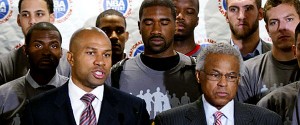
Union president Derek Fisher and union executive director Billy Hunter have the full support of the players. (N.Y. DAILY NEWS)
The NBA regular season is now on it’s 11th hour and 59 minutes. The preseason is gone and now the league is threatening to cancel the first two weeks of the real games unless some semblance of a new collective bargaining agreement is reached on Monday. Players union president Derek Fisher and union executive Billy Hunter are urging the players to “stand united,” and Fisher has gone out of his way to send that message to the rest of the players.
The main issue remains the split of the basketball related income. The players, especially superstars Kevin Garnett and Dwyane Wade, are not ready to give up their 57% cut of the BRI – which includes jersey sales and money earned from commercials – and have been very clear to the owners that they are not going to dip past 53%. Commissioner David Stern proposed a 50-50 split of the BRI, which the players quickly dismissed.
The BRI debate is just one of many issues facing the players. If you are in their shoes, and those would be extremely big shoes to fill, would you even consider signing off on these deals? Various sources with knowledge of the talks have shared some of the concepts being discussed with ESPN.com. Possibilities presented by the league as alternatives to a hard cap include:
• The institution of a sliding “Supertax” that would charge teams $2 in luxury tax for every dollar over $70 million in payroll, $3 for every dollar over $75 million in payroll and $4 for every dollar for teams with payrolls above $80 million
• A provision to allow each team to release one player via the so-called “amnesty” clause and gain both salary-cap and luxury-tax relief when that player’s cap number is removed from the books
• Shortening guaranteed contracts to a maximum of three or four seasons
• Limiting Larry Bird rights — which enable teams to exceed the salary cap to re-sign their own free agents — to one player per team per season
• Reducing the annual mid-level exception, which was valued at $5.8 million last season, to roughly $3 million annually and limiting mid-level contracts to a maximum of two or three seasons in length as opposed to the current maximum of five seasons
• A new “Carmelo Rule” that would prevent teams — as the New York Knicks did in February with Anthony — from using a Bird exception to sign or extend a player acquired by trade unless they are acquired before July 1 of the final season of the player’s contract
• The abolition of sign-and-trades and the bi-annual exception worth $2 million
• Significant reductions in maximum salaries and annual raises and a 5 percent rollbacks on current contracts
There are also still some teams, sources say, who are pushing for some sort of franchise-tag system similar to what the NFL employs as well as a restriction that allows big spending teams to exceed the annual luxury-tax threshold only twice every five seasons.
It remains to be seen how many of these concepts, many of which have been met with union resistance, actually become elements of a deal. According to several reports, the Fisher and Hunter met with the representatives from the owners’ side on Sunday night so everything is still in limbo. TNT’s David Aldridge says both sides remain $120 million apart. If that’s all, then anything less than a new deal is unacceptable at this point because both sides stand to lose $200 million if games are lost.
Source: ESPN.com